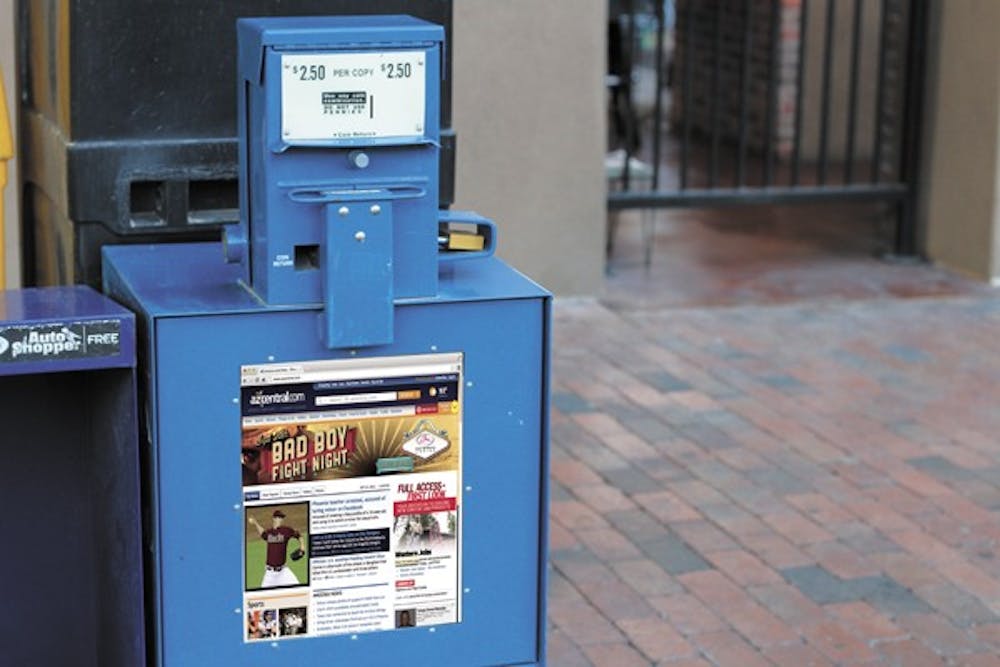 A newspaper box is seen on the corner of 6th Street and Mill Avenue late Wednesday. Media outlets are implementing online paywall systems, which limit the amount of content non-subscribers have access to. (Photo illustration by Sam Rosenbaum)
A newspaper box is seen on the corner of 6th Street and Mill Avenue late Wednesday. Media outlets are implementing online paywall systems, which limit the amount of content non-subscribers have access to. (Photo illustration by Sam Rosenbaum)One of the Valley’s largest news organizations implemented an online-paid subscription Monday, following national trends.
The Arizona Republic joined fellow Gannett publications, like USA Today, in creating a new pay model.
Gannett, one of the nation’s largest media companies, plans to commit all 80 of its community media outlets to some sort of online-paid model by the end of the year.
National publications such as The Wall Street Journal and The New York Times have also ended unlimited free access to digital content, but a few major newspapers, like The Washington Post, have stood firmly against such payment models.
Journalism senior Brittany Barlow-Sanchez said all four of her journalism classes require her to read the news daily and some teachers even ask students to buy smartphone applications.
“I’ve avoided (paid subscriptions),” Barlow-Sanchez said. “I’m on a tight budget right now because I just got married. I go around it by using Google.”
She said from a journalist’s perspective she recognizes why certain companies have made the switch.
“I do think it’s a good idea, because you’re getting more flow of cash for what you’re writing,” she said.
Others feel like it’s simply not right to charge for the news.
Political science senior Brendan Arnold said he gets his news from National Public Radio and a few political blogs.
Arnold said he understands news outlets are struggling right now and that they have to find a new way to make a profit, but paid online subscriptions are an extraneous fee.
“It creates this big class dynamic as who has access to information,” he said.
Arnold said knowledge is power, and people who have access to this vital information are inherently better off.
He said, “Do we really want to hold certain information from the public?”
Each company has a different payment model. Companies offer monthly subscriptions for newspapers, digital news and tablet or smartphone apps.
The Arizona Republic plans to start keeping track of how many times people view their content by Monday. Less frequent visitors won’t have to worry about such obstacles if they stay under 20 clicks per visit.
People can sign up for full access to The New York Times’s digital content for $8.75 per week and The Arizona Republic’s for $10 per month.
Some companies offer discounts for first-time subscribers. New digital subscribers to The Wall Street Journal pay nothing the first month and $5.99 per month after the trial.
The New York Times reduces the price to 99 cents for the first month. After the first four weeks, students pay $17.50 per month for full access, half of the newspaper’s online standard subscription rate of $35.
Journalism professor Tim McGuire, former managing editor of the Minneapolis Star Tribune, said getting access to the information isn’t the problem; it’s whether readers want to pay for branded news.
“If they want branded news, it’s becoming very likely they’ll have to pay for it,” McGuire said.
He said publications that implement online paid subscriptions have an older audience who is willing to pay for the content.
McGuire said nobody would benefit from The Arizona Republic going out of business, because Valley residents would lose a major source of local news.
Companies need to come up with a way to financially keep their businesses afloat, he said.
“We can only offer what we can afford,” he said.
McGuire said the younger generation has grown up in an era where information is free, which is why the creation of paywalls is an issue.
“People got used to (news) being free,” he said.
Reach the reporter at amrami13@asu.edu




